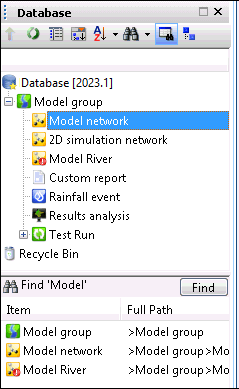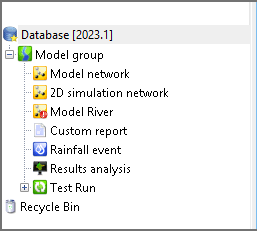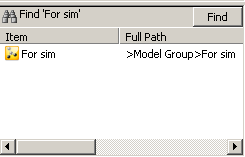The Explorer is a dockable window that provides a hierarchical representation of the data within the current database. The window displays the database contents as a tree and provides a range of facilities to manage the tree data.
To display the
Explorer window, select New
Explorer window from the Window menu or click
 in the
Docking Windows Toolbar.
in the
Docking Windows Toolbar.

Example of Explorer window in InfoWorks ICM
When the
Explorer is first opened, the database is displayed at the top level of the tree. Double-click on a Group or
Asset group icon in the tree to move the selected group to the top of the display. Click
 in the
Explorer toolbar to move one level up the tree view.
in the
Explorer toolbar to move one level up the tree view.
Multiple Explorer windows can be opened. To open a Group or Asset Group in a separate Explorer Window; right-click on the group and select Open from the context menu. A new Explorer Window will be opened with the selected group as the top level displayed in the window.
The Explorer window is composed of the following parts:
Title Bar
The Title Bar displays the name of the top level in the tree view currently being displayed.
This will either be 'Database' or the name of the Group or Asset Group currently displayed.

Toolbar

The following commands are available from the toolbar:
| Toolbar Icon | Description of functionality |
|---|---|
|
Up |
Move one level up the tree view. For example, a parent Asset group or Group. This button is disabled if the top level (Database) is already displayed. |
|
Refresh |
Refresh the tree view to take account of recent changes. |
|
Show Details |
Display or hide details for each item in the tree. The details displayed are:
|
|
Sort Columns |
Enable items in columns to be sorted by name when you click on the column header. |
|
Sort By |
Sort tree items alphabetically by a selected parameter within their Asset groups. The options are:
Version controlled items are only sorted at the top level. Any branches below that level are not sorted The above details can be displayed in the by clicking on the
|
|
Find |
Select on option to find items in the tree. The options are:
|
|
Show Find Window |
Display the Find Window in the bottom part of the Explorer Window. |
|
Show Hidden |
Display or hide objects in the tree. |
Tree view
Database items are displayed in a hierarchical tree:
- To open or close a group in the tree, click on the
 or
or
 symbols to the left of the group name or double-click on the group name.
symbols to the left of the group name or double-click on the group name.
- To perform a task on an item in the tree, click on the item and select an option from the InfoAsset Manager menus or right-click on the item and select an option from the context menu.
- Hover the mouse cursor over the item in the tree to display a tooltip listing the item's details
For a full description of the different icons displayed in the tree, see Database Items, and see Working with Database Items for details about working with them.

There are a number of options available in the window which can be accessed by right-clicking in the white space at the bottom of the tree view section and selecting from the context menu. These options are also available from the Explorer Window Toolbar.
|
Menu Option |
Description |
|---|---|
|
Refresh view |
Refreshes the view to take account of recent changes. |
|
Show Details |
Details can be displayed or hidden for each item in the tree when Show Details is checked or unchecked in the menu or when you click
The details displayed are:
|
|
Sort Columns |
Enables items in columns to be sorted by name by clicking on the column header. |
|
Sort By |
Sorts items by selected parameter. The options are:
Version controlled items are only sorted at the top level. Any branches below that level are not sorted Details can be displayed or hidden for each item in the tree by checking / unchecking Show Details from the menu or by clicking on the
|
|
Show Hidden Items |
Hidden objects can be displayed or hidden in the tree by checking / unchecking the Show Hidden Items menu option. |
|
Properties |
Displays the InfoAsset Manager About Box. (Displays the Properties Dialog for the item when selected from the item's context menu) |
Find window
This window displays the results of searches carried out on the database tree. To search for database items click either
 in the
Explorer toolbar or the Find button in the Find Window.
in the
Explorer toolbar or the Find button in the Find Window.
The options are:
- Find Modified - searches for items with uncommitted changes
- Find Associated - searches for associated items. For example, click on a Network in the database tree and use the Find Associated option to find any Workspaces that use the network.
- Find - displays the Find in Database dialog. Type in text to search for and the property to search e.g. Name or Type.

The following actions can be performed on a selected search result via the context menu:
- Open - Opens the selected database item in the GeoPlan Window.
- Select in Tree - Selects the database item in the tree view.
Note: When Select in Tree is selected for a database item within a database for which the Show Hidden toolbar option has not been activated, the Selected Hidden Object dialog is displayed. This dialog allows you to select an option to view the database item.
- Properties - opens the Properties dialog for the selected database Item.
In addition, version control menu options are available for version controlled objects.
See the Finding database items in the tree for detailed instructions on how to search the database tree.





